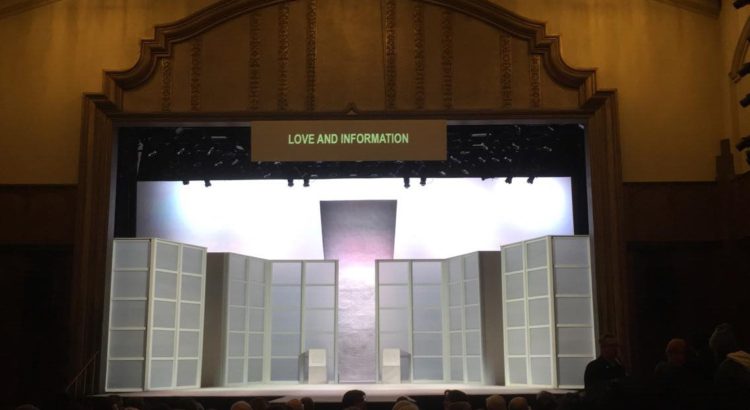What’s the purpose of life if not to find love and learn information? “Love and Information” features many short vignettes of everyday life, showing scenes everyone can relate with to some extent. With the anonymous characters running around onstage, there is a universality of the scenes that makes everything connect. The play explores different variances of love and methods of information as the characters struggle to gain information and connect with others.
The title of each vignette aptly described the main point of a scene. Words such as “secret”, “remote”, “silence”, “dream”, “privacy”, “children”, and “facts” convey the information within that scene in a succinct way, while giving some frame of reference so the audience isn’t completely lost. The reoccurrence of certain themes, such as the child who didn’t know certain emotions, brought an underlying thread between these vignettes that might otherwise be hard to connect.
The 18-person SMTD cast embodied all the characters wonderfully, slipping into one persona only to run offstage and return as someone completely different, though the intrinsic drives of that person remain the same. This show, written in 2012, remains completely contemporary, featuring the latest dance moves and songs and all the current trends. The presence of screens on cell phones and televisions is also prominent, a modern source of constant information, one that can invade our privacy and also steal our attention.
The stark contrasts of some of the scenes leave a stronger resonance. One character has perfect memory and can recall any detail of any date, while another character can no longer recognize his own wife. One character suddenly and happily remembers a vivid memory of his dad during a memory game, while another character is traumatized by a flashback they wish they never remembered. Information is fleeting, and it can also be absolute.
The same can be said of love. Affairs can mean the end of something great, or the start of something better. As one vignette points out, sex is a way of transferring and creating information through an act of love, connecting the title of this play neatly.
The play ponders the question of science, philosophy, religion, mathematics, politics, and humanity — everything that gives us thought, forms our personalities, and makes us human. The characters range from children to elders, and it also touches on mental illnesses, such as schizophrenia and attempted suicides.
One of the most appealing aspects of the play was the scenery, set designs, and costumes. Each separate scene was distinguished by its color, and all the props and clothing accessories that appeared in the scene emphasized this distinct feature. With a chilling white backdrop surrounded by white boxes and actors in all white clothing to start with, the evolving and uniforming color schemes around this base neutral color brought life to this play.
Love and information can bring great joy and meaning to our lives. However, loss and pain are also facets of love, just as information can be painful and lost just as easily. This play leaves us trying to make sense of the universe, our existence, our relationships, and our daily lives.






